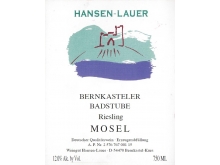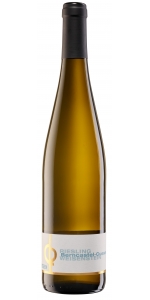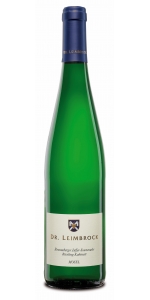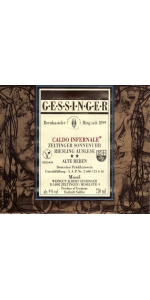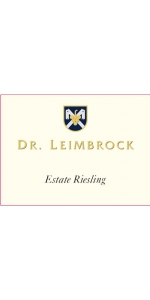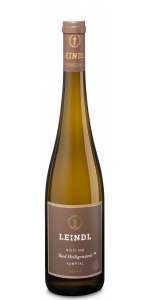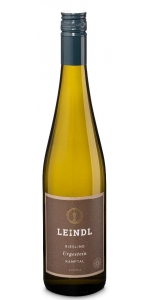Hansen Lauer Bernkasteler Badstube Riesling 2023
6 bottles with free shipping for: $150.00
12 bottles with free shipping for: $240.00
| BUY MORE! SAVE MORE! | ||||||||||||||||||||
|
Hansen Lauer Bernkasteler Badstube Riesling is a nice Mosel-Riesling with a lot of minerality and a hint of stewed apple, cantalope and dried orange flavors. The finish is long and clean, which make it very easy to drink.
This is coming from grapes grown on 100% Devonian slate soils. After harvest, the grapes are sorted in order to keep only the best quality. It is then aged on the lees for more than 6 months, giving the wine richness and depth.
The Hansen Lauer Bernkasteler Badstube Riesling goes well with turkey and seafood
The Hahn Estate
The Hahn family has been in the wine business since 1650 and moved to Kobern, the present location, in 1892 to start a small winery. Konrad Hahn took over the operation in 1991, when his father retired, and works now with his Colorado-born wife Laurel Kerns-Hahn. The winery is recognized as one of the top estates in the region. The high quality of the wines is continuously confirmed by awards and medals received in regional and national as well as international competitions.
The Hahn Vineyard
The vineyards are located in Michelsberg, which is near the town of Piesport (Mosel Valley). In this most northern part, the Mosel valley is very narrow and the vineyards very steep. The warm micro climate and the use of terraces along the south facing slopes allows the vines to grow to full ripeness despite the northern location. The use of machinery is impossible and all work including harvesting is done by hand. The grapes for this wine were grown in slate soil, which is typical for the Mosel area and provides a unique minerality. The harmonious climate, warm summers and mild winters promote a long growing season providing fine fruit with balancing acidity and low alcohol.
A warm, but by far not as hot summer as 2003, continued into a beautiful sunny autumn. This allowed a perfect ripening of the grapes in 2005 vintage. Especially the always late ripening Riesling grapes achieved exceptional quality with must-weights similar to 2003 but with higher acidity levels and mineral concentration similar to 2004.
We view the 2005 vintage as the best vintage in our estate in years even though it is following several great vintages such as 2001, 2002 and 2003. We are very excited about this great vintage
Bastgen Berncastel-Cueser Weisenstein Riesling Spatlese Trocken is made from 100 percent Riesling.
Bright, clean, fresh and zesty. Grapefruit like flavors. Fruity aromas and a nice minerality, typical of the Riesling grape grown on blue slate soil. Round, rich and a very long finish. The grapes for this wine are vigorously selected. Botrytis is not tolerated. At harvest the grapes are fully ripened, have a golden color, and a soft tartness. After a long spontaneous fermentation in a traditional 1000L barrel, the wine just reaches the dry stage. This gives the wine a creamy structure that interplays with ripe yellow and exotic fruit aromas.
They meticulously tend 4.5 ha (11.11 acres) of which 80% is Riesling. The soil is made of slate. Their vineyards are located in Kesten and Brauneberg, on a steep terrace, and planted to 50-year old vines. Fortunately for Bastgen, they own part of the famous Brauneberger Juffer Sonnenuhr. The vines produce very small, ripe berries that are very tasty.
Dr. Leimbrock Brauneberger Juffer Sonnenuhr Riesling Kabinett is made from 100 percent Riesling.
Brauneberger Juffer and Juffer-Sonnenuhr are one of the most prestigious vineyards in the winegrowing region Mosel. The vineyard faces south and provides best conditions to plant the Riesling vines.
Juicy and aromatic with a wonderful drinking flow and aromas of melon, stone fruit and apple. Makes you want the next sip.
ABV: 9.1%
TA: 7.5
RS: 36.5 g/liter
Gessinger Zeltinger Sonnenuhr Riesling Auslese Alte Reben Caldo Infernale made from 100 percent Riesling.
The Zeltinger Sonnenuhr Riesling Auslese Caldo Infernale was produced from over 100-year-old ungrafted vines in the Gewann “im Kalk,” the original part of the vineyard. This is a typical Devonian slate Riesling with fruity elegance and great durability.
Although riper elements of yellow peach, coconut, Victoria pineapple, and almond cream directly capture the attention, the nose maintains a fresh character with minty and zesty notes. The wine shows ripe and sweet elements on the palate, and has quite some creamy and juicy elements such as canned yellow peach and pineapple. The finish brings the right amount of zest to lift up the aromatics and adds focus and tension, while there is an almost Eiswein-type of acidity in the aftertaste. This is a gorgeous Auslese.
Dr. Leimbrock Estate Riesling is made from 100 percent Riesling.
Typical Riesling, fresh and fruity, easy drinking. Grapes come from Brauneberger Juffer and Juffer-Sonnenuhr - one of the most prestigious vineyards in the Mosel winegrowing region. The vineyard faces south and provides the best conditions for growing Riesling.
Pairs well with barbecue meats, pasta dishes.
Leindl Riesling Zobinger Heiligenstein Kamptal is made from 100 percent Riesling.
Medium yellow green. Fine nuances of ripe apricot, a hint of yellow apple, delicate herbs and spices, mineral Touch, hints of candied orange zest. Juicy, elegant, fine stone fruit, touch of finesse acidity, salty minerality in the finish, remains long, already well to drink.
Cold Fermentation.
Aged on the lees for 12 months in Stainless Steel tank. No Oak.
No ML
Review:
"This excellent expression of the Heiligenstein site has a wonderful youthful tension. The sleek, medium-bodied palate features understated power, great precision and Amalfi lemon freshness. Very long, focused finish with a cascade of dry flowers. Sustainable. Drink or hold. - Stuart PIGOTT"
- James Suckling (September 12th 2024), 95 pts
Leindl Riesling Urgestein is made from 100 percent Riesling.
- back
Boussey Meursault Les Meurgers is made from 100 percent Chardonnay.
The grapes for Meursault Les Meurgers are coming from the parcel located on the route to Auxey Duresses, in a horseshoe shape ravine. The grapes always reach ripeness quite early in the season. The name of this village comes from the efforts undertaken by man to plant vines in extremely stony soils. Stones that were thrown formed piles, that are called "murger".
Rich and luxurious wine, well balanced and structured in the mouth. Beautiful golden yellow in color with green highlights. It boasts aromas of toasted nuts, ripe fruit and a very delicate oak aroma. On the palate it is dry and mellow with a lingering smooth finish.
Pair with foie gras, lobster, seafood, poultry and fruit tart.
Ambre de Maltus Bordeaux Blanc is made from 70% Sauvignon Blanc, 30% Sémillion.
Malolactic fermentation.
The wine was aged in French Oak barrels for a few month (between 6 and 8 months depending on the barrel's toastiness and cooper)
Delicious with grilled fish or grilled vegetables

